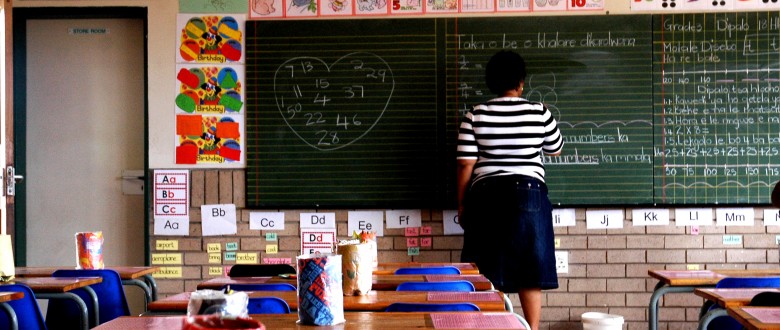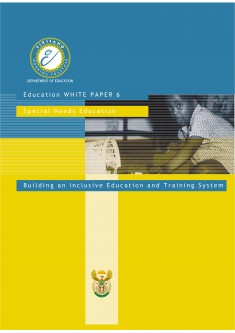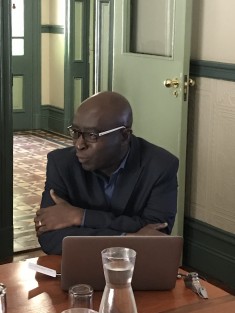
In July, South Africa’s most prominent inclusive education experts put their heads together for the ‘Teacher education for inclusive teaching’ symposium, co-hosted by VVOB. Headlining the symposium as keynote speaker was none other than Professor Kwame Akyeampong, professor of International Education and Development at the Centre for International Education of the University of Sussex: “The learning gap between advantaged and disadvantaged learners is widening. Teacher practices still too often serve the interests of the former over the latter.”
Grasping the concept of inclusive education in South Africa
In many countries around the world, disadvantaged and vulnerable learners can benefit most from quality education, yet learn least. The South African constitution is ambitious when it comes to guaranteeing inclusive education to all learners, with Education White Paper 6 having celebrated its 18th birthday this past July.
White Paper 6 outlines how the South African government plans to establish an inclusive education and training system that enables “all learners to participate actively in the education process so that they can develop and extend their potential and participate as equal members of society”.
Citing guiding principles such as social justice, social integration and equal access, White Paper 6 uses a broad definition of inclusive education. Instead of focusing primarily on learners with disabilities, inclusive education should acknowledge and respect “differences in learners, whether due to age, gender, ethnicity, language class, disability, HIV or other infectious diseases”. Barriers to learning may indeed stem from disabilities, but more often from stereotyping of differences in education settings, unsafe school environments or inadequately trained teachers, among others.

In other words: barriers to learning can be intrinsic to the learner (e.g. psycho-social difficulties or a disability), be extrinsic or related to the learner’s environment (e.g. poverty or conflict), or stemming from inadequate education systems and pedagogies.
Read more with Moving from policy to practice for inclusive education: 5 lessons learnt. From our year-long unique experience working on inclusive education in partnership with the South African Department of Basic Education, VVOB puts forward 5 good practices for inclusion.
Symposium 2019: teachers at the centre
While inclusive policies have been firmly in place in South Africa for close to 20 years now, implementation has proven more challenging. Working within the set policy frameworks, teachers are charged with the important task of realising meaningful participation of all the learners in their classrooms. But before they can fulfil the expectations as set out in White Paper 6, teachers too need to rely on a teacher training that has adequately prepared them to put inclusive education into practice.
The 2019 symposium in Vanderbijlpark on ‘Teacher education for inclusive teaching’ (2-4 July 2019) focused on ‘Shifting towards inclusive mindsets: achieving meaningful participation for all’. Academics, practitioners and government officials came together for three days of panel discussions, practice-oriented discussions and other knowledge-sharing opportunities centred around one big question: Which reforms should teacher education undergo, so teachers can effectively carry out inclusive pedagogies and classroom practices?
Professor Kwame Akyeampong, from the Centre for International Education at the University of Sussex, was received as the international keynote speaker. Providing participants with a view of inclusive education on a global scale, he stressed the importance of teacher agency in the road to achieving inclusive teaching practices. He also outlined his holistic vision to inclusive education, which includes knowledge-sharing, professional learning communities, work-integrated learning and the use of ICT to give teachers more wiggle room when it comes to time management.
“Diversity contributes to learning and to society”
Backstage at the symposium, VVOB sat down with Professor Akyeampong to pick his brain further on the topic of teacher education and its role in achieving true inclusive education everywhere. What follows are just snippets of the full interview with Professor Akyeampong.
“Inclusive education recognises that learners are different, and therefore require different approaches”, Professor Akyeampong starts. Responding to the question of the importance of inclusive education, he cites international studies showing the widening learning gap between advantaged and disadvantaged learners. Teaching practices still too often serve the interests of the former over the latter, he says. “If we do not address this learning gap, we are going to create a world or a society in which we are more likely to see conflict, as those who have been left behind feel aggrieved.”

In Professor Akyeampong’s view, teachers are pivotal in creating a future where we embrace diversity and put it to good use for society: “The classroom is the place where teachers can give value to diversity and show that children from different backgrounds, with different experiences, contribute to the learning space and to society.”
In other words, teachers can keep on reproducing exclusion, or break the cycle and create more inclusion. But unfortunately, teacher education, especially in Sub-Saharan Africa, does not sufficiently prepare teachers to manage the widening learning gap. “Teachers must be able to recognise that many of the children who are being left behind, are being left behind precisely because the education system or school fails to address their learning needs”, explains Professor Akyeampong.
Teachers and teacher educators as agents of inclusive change
So how should we reorganise teacher education so teachers can adequately respond? For Professor Akyeampong, it revolves around giving student teachers access to schools at the earliest possible stage, so they appreciate the needs of different learners, and around giving them access to the knowledge shared in professional learning communities. “In short, it should be about opening up space in teacher trainings so this knowledge-sharing can be part of the process of ‘learning to teach’. If we do this, our prospective teachers are better prepared to be agents of change.”
Turning to the question of ownership and responsibility for making inclusive education reality, Professor Akyeampong sees an important second actor next to the government: teacher educators. Yet changing the mindsets of these professionals, who were themselves trained in a traditional un-inclusive way, has proven a challenge in his line of work.
But Professor Akyeampong has a plan: “It is important we engage teacher educators in the research on inclusive education. We need to help them rethink what works and what does not work, using evidence. If they are training teachers who are not making a difference in their respective classrooms in terms of learning outcomes, we have to ask the teacher educators what they think is happening, and how they can be agents to rectify this.”
Lifelong learning to teach
We need to bring the real world of the classroom into the college at an early stage, says Professor Akyeampong. “We often use models in teacher education that do not embrace the realities of what actually works on the ground. And I think we can close the learning gap much quicker if we tap into teaching practices that have proven successful. We should identify these practices, learn from them, and then mainstream them in our teacher training.”
“Teaching is a hard job”, Professor Akyeampong concludes. “But just when teachers make the transition to their teaching jobs, we withdraw support. This is where we have not done enough.” Professor Akyeampong makes a case for approaching ‘leaning to teach’ as a lifelong process, and to support teachers on inclusive education long after they finish their teacher training, to make sure they are not overwhelmed in the teaching field and leave it.
Click here for the full interview with Professor Akyeampong. We look forward to meeting him again at the 2019 UKFIET conference in September, which Professor Akyeampong is chairing.
The ‘Teacher education for inclusive teaching’ symposium – as well as its two predecessors – was part of VVOB’s EU-co-funded project ‘Teaching and learning for inclusive education’. We would like to thank the University of the Free State (UFS) and the Central University of Technology (CUT) for co-hosting, and the European Union for their valuable support.




